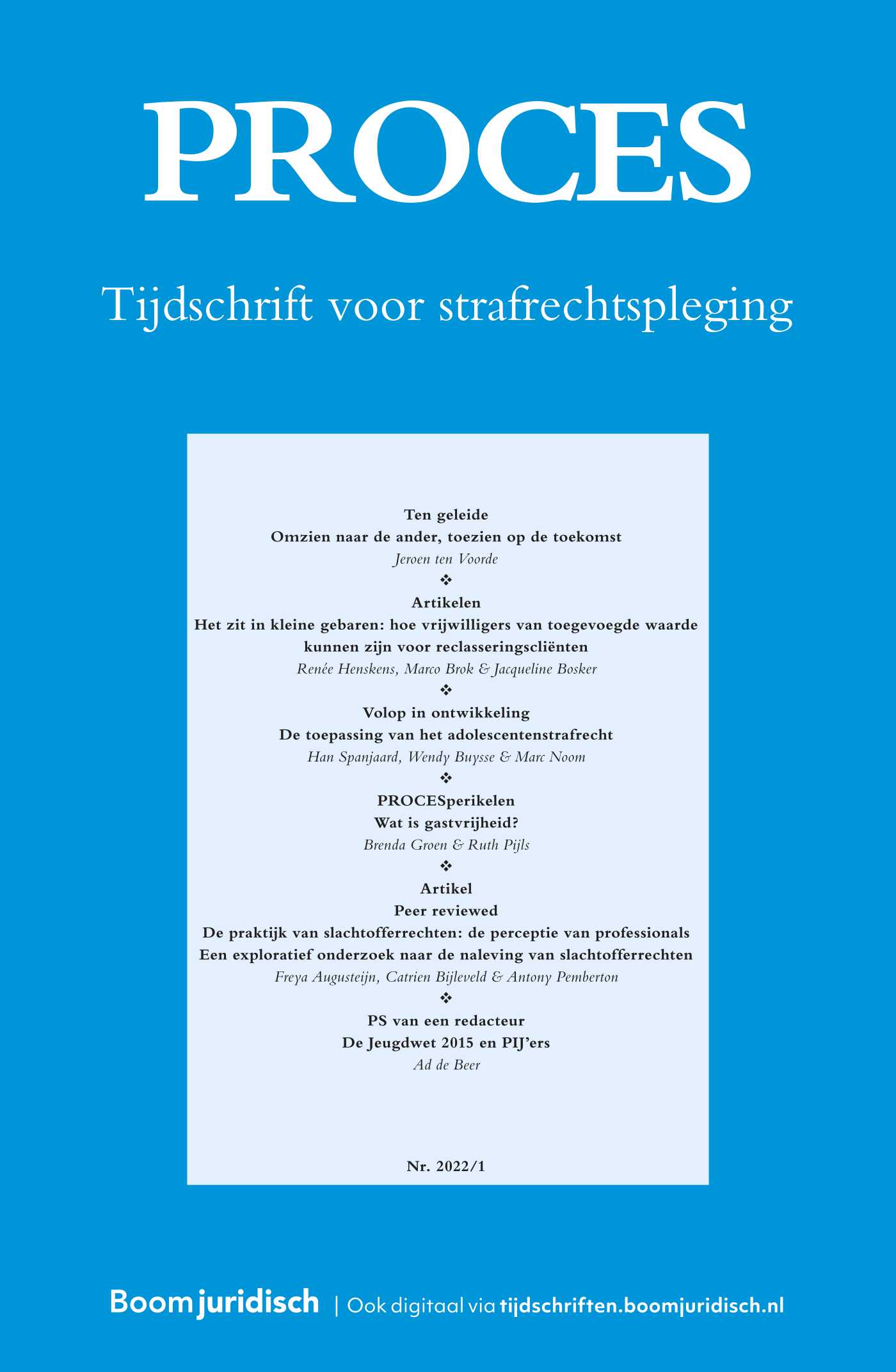|
In previous observational studies among operational police officers, some officers stated that if a victim is not willing to (officially) report a crime to the police, they are not able to police these cases. This rather cynical and fatalistic statement raises several questions. What do police officers mean when they say this? What do they actually do in those cases and why? In this paper we try to answer these questions based on explorative qualitative interviews with several police officers in two police teams in the Netherlands. The results show that even though police officers recognize these statements among their colleagues, they do not agree with them and in practice police officers show a lot of effort and involvement in these cases. In fact, police officers have several possible strategies available to deal with these cases. Which strategy they opt for depends on various pragmatic, organisational and moral considerations. |


PROCES
Meer op het gebied van Criminologie en veiligheid
Over dit tijdschriftMeld u zich hier aan voor de attendering op dit tijdschrift zodat u direct een mail ontvangt als er een nieuw digitaal nummer is verschenen en u de artikelen online kunt lezen.
| Ten geleide |
Afstand houden! |
| Auteurs | Prof. dr. mr. Jeroen ten Voorde |
| Auteursinformatie |
| Peer reviewed |
|
| Trefwoorden | politie, autonomie, aangifte, politiestrategieën |
| Auteurs | Mr. dr. Renze Salet, Mr. Melvin Kremers en Prof. dr. ir. Jan Terpstra |
| SamenvattingAuteursinformatie |
| Artikel |
De politie als nationale hulpverlenerPolitieoptreden bij incidenten waarbij personen met verward gedrag betrokken zijn |
| Trefwoorden | Verwarde personen Persons with confused behavior, GGZ Mental health service, Frontlijnwerkers Police officers, Lipsky |
| Auteurs | Drs. Milou Janssen en Dr. Jelle van Buuren |
| SamenvattingAuteursinformatie |
|
Incidents involving persons with ‘confused behavior’ are an important and topical theme in Dutch society. The police are often the first to be involved in these incidents because they are the only public organization that has a 24/7 presence on the streets. In 2019, the police registered 96,000 reports of persons who showed confused behavior. It is therefore not surprising that the police have repeatedly drawn political-administrative attention to this situation and indicated that the limits have been reached. That raises the question of how police officers deal with a situation that has actually grown above their heads in daily practice. In this research, based on the theory of street-level bureaucracy introduced by Lipsky, it was investigated how police officers in The Hague use their discretion to cope with this difficult reality. |
| PROCESperikelen |
Enkele overpeinzingen van een zzp’er in het veiligheidsdomein |
| Auteurs | Mr. Meike Kemna |
| Auteursinformatie |
| Artikel |
De Nederlandse positie ten opzichte van godslastering in internationaal verband |
| Trefwoorden | Godslastering, Blasfemie, vrijheid van meningsuiting, Legalisering |
| Auteurs | Mr. Tom Huisjes |
| SamenvattingAuteursinformatie |
|
In 2014, the Dutch government abolished its ban on blasphemy, which had laid dormant in its criminal code for decades. Similar laws have been abolished in nine other jurisdictions in the West since an international campaign to this end started in 2015. This article first describes the tension between blasphemy laws and the freedom of expression. It then examines the Dutch position on blasphemy in its international context. This article argues against bans on blasphemy and specifically against a potential reintroduction of a de facto ban on blasphemy in the Netherlands. Moreover, it argues in favour of applying political pressure to abolish bans on blasphemy around the world as well as giving diplomatic support to those affected by these laws. |
| Artikel |
Bestuursrechtelijke victimologieEmpirisch-juridisch onderzoek naar het slachtoffer in de bestuursrechtelijke procedure |
| Trefwoorden | bestuursrecht, victimologie, slachtofferschap, empirisch-juridisch onderzoek |
| Auteurs | Mr. dr. drs. Benny van der Vorm |
| SamenvattingAuteursinformatie |
|
The victim’s position in Dutch criminal law has been strengthened. There has been an emancipation of the victim in criminal law. However, not much attention is being paid on the role and position of the victim in the Dutch administrative procedure. This article explores the scope of what is called ‘Administrative victimology’. Administrative victimology is an empirical science that deals with the position and legal role of the victim in the administrative procedure. It is expected that this ‘new’ type of victimology will become more important in the years to come. |
| Peer reviewed |
De ‘Gulden Route’ in de realiteitHet verloop van verlof tijdens tbs |
| Trefwoorden | verlof, tbs |
| Auteurs | Maartje Clercx MSc, Marije Keulen-de Vos PhD en Hyacinthe van Bussel MBZD |
| SamenvattingAuteursinformatie |
|
Rehabilitation of hospitalized offenders is a stepwise process ideally achieved through four consecutive types of leave: supervised, unsupervised, extra-institutional and a probational leave. However, in reality this sequence may often be deviated from. The current study was undertaken to examine the most common deviations and the relationship with how the treatment ended (e.g. positive/negative). File information of 422 offenders previously admitted to a high-secure forensic hospital was used. Deviations from the standard sequence are relatively common. Probational leave is often missing, and one in ten sequences contains a suspension of leave. The relevance for forensic and legal professionals is discussed. |
| PS van een redacteur |
Voorzorg |
| Auteurs | Dr. Jaap A. van Vliet |
| Auteursinformatie |

